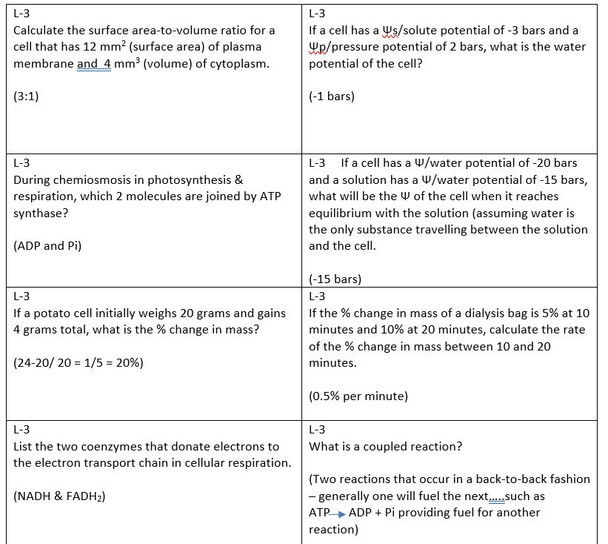Description
This bundle includes all FIVE AP Biology Greed games that cover an ENTIRE YEAR of curriculum!! There are approximately 750 questions included between all five kits.
This is a review game that I created about 20 years ago and it has stood the test of time in my AP Biology classes. It promotes mastery of content and allows students to work at their own pace. My AP scores increased significantly once I implemented this game before each Midterm Exam and the AP Exam. Student groups of four work great with this activity and 45 minutes is an adequate amount of time to spend playing Greed. What is great about this game is that students get through a ton of review questions in a short period of time. In addition, they are asking each other questions out loud which means they are pronouncing vocabulary terms (very important to solidify higher level concepts). They are also coaching and explaining concepts to one another throughout the game which means that all students are learning throughout the entire activity.
Instructions are included with each game . There are Level 1, Level 2, and Level 3 questions. The questions get harder with each level. As students move through the levels they must decide if they will stay at a certain level and keep their points or wager their points by moving to the next level. These questions can be easily modified to fit your curriculum exactly or you can simply use the questions that are included.
This game is structured enough that student groups are completely self-sufficient meaning they won’t need a lot (if any) input/interaction from the teacher so you will be free to get grading or other tasks done during class time! The best thing about Greed…….it is original. Because students haven’t played it a million times, they will find it engaging, challenging, competitive, and fun. My students absolutely love Greed!!
Greed Game #1 (Organic Compounds & Chemical Reactions) This kit comes with approximately 100 question cards with answers. The following topics are included:
1. Properties of Water (Excellent Solvent, Surface Tension, High Heat Capacity, Ice Floats, Cohesion/Adhesion)2. Organic Compound Structure (Carbohydrates, Lipids, Proteins, Nucleic Acids)3. Biogeochemical Cycles (Carbon/Oxygen and Nitrogen)4. Dehydration Synthesis vs. Hydrolysis Reactions5. Energy and Chemical Reactions (Exergonic vs. Endergonic, Entropy, Stability, Capacity to do Work, 1st and 2nd Law of Thermodynamics)6. Enzymes (Structure, Function, Allosteric Enzymes, Feedback Inhibition, Cofactors)
Greed Game #2 (Cell Structure, Cell Transport, Cell Energy). This kit comes with approximately 150 question cards with answers. The following topics are included:
1. Cell Structure and Function (Cell Theory, Organelles, Endomembranal System, Prokaryote vs. Eukaryote Cells, Plant vs. Animal Cells)
2. Structure of the Plasma Membrane3. Cell Transport (Active and Passive Transport, Water Potential, Hypertonic, Hypotonic, Isotonic.....)4. Photosynthesis (Light vs. Dark Reaction, CAM Photosynthesis, C4 Photosynthesis)5. Cellular Respiration (Glycolysis, Krebs Cycle, Oxidative Phosphorylation, Fermentation)
Greed Game #3 (Molecular & Mendelian Genetics) This kit comes with approximately 120 questions and answers. The following topics are included:
1.DNA Structure, DNA Scientists, & DNA Replication2. Protein Synthesis & Gene Regulation (Lac Operon Model)
3. Punnett Squares & Genetic Disorders4. Mitosis and Meiosis, Regulation of the Cell Cycle (Cancer, Cyclin, MPF)5. Gene Linkage
Greed Game #4 (Genetic Engineering, Evolution, Classification) This kit comes with approximately 170 questions. The following topics are included:
1. Genetic Engineering (Practical Applications, Restriction Enzymes, Bacterial
Transformation, Gel Electrophoresis)
2. Evolution (Genetic Variation, Mechanisms for Evolution: Natural Selection,
Migration, Genetic Drift, Hardy-Weinberg Equilibrium, Patterns of Evolution:
Gradualism vs. Punctuated Equilibrium, Allopatric vs. Sympatric Speciation,
Darwin’s Finches: Adaptive Radiation, Convergent vs. Divergent Evolution,
Reproductive Barriers, Evidence for Evolution: Fossil Record, Comparative
Embryology, Comparative Biochemistry, Homologous vs. Analogous Structures,
Vestigial Organs, Biogeography
3. Classification: Archaebacteria, Eubacteria, Protists, Fungi, & Plants
4. Origin of Life on Earth: Focus is on early atmosphere and pattern of evolution,
mass extinctions
5. Plants: Taxonomy of the four major groups: Mosses, Ferns, Gymnosperms,
Angiosperms, Adaptations of Angiosperms to life on land (The flower, the seed,
xylem/phloem, stomata), Plant hormones
Greed Game #5 (Homeostasis in Animals, Body Systems, Ecology) This kit contains approximately 215 questions. The following topics are included:
1. Comparison of Animal Phyla with a focus is on homeostatic mechanisms (such as comparing the gastrovascular cavity of a jellyfish to a full digestive tract of an earthworm...emphasis on compartmentalization which is an AP Biology theme), excretion of nitrogen waste, reproductive strategies, gas exchange, circulation of fluids, as well as a simplified comparison of nervous systems. Some questions also focus on evolutionary patterns (order of evolution, convergent evolution, analogous/homologous structures......)
2. Human Nervous System with a focus on cellular mechanisms and cell-to-cell communication. (Sodium/Potassium pump, chemical/electrical nature of the impulse, the synapse, reflex arc.....)
3. Human Immune System with a focus on cell-to-cell communication (Innate/non-specific immunity, Acquired immunity, macrophages, T cells, B cells, macrophages, antigens, antibodies, cell-mediated response vs. humoral response).
4. Hormone Action with a focus on cell-to-cell communication. (special focus on the cellular effects of glucagon and insulin as well as the three stages of cell signaling involving a hormone: reception, transduction & cellular responses.
5. Ecology (Population Ecology - logistic & exponential growth, Limiting Factors, Food Webs and Energy Flow, Primary Productivity, Biomes, Symbiotic Relationships, Mimicry & Camouflage, Human Impact on the Environment).






















